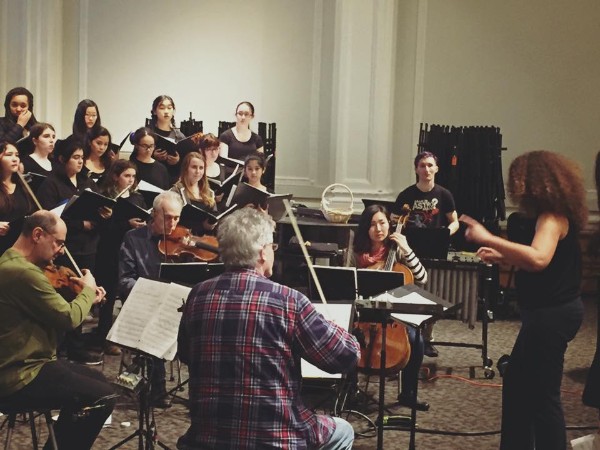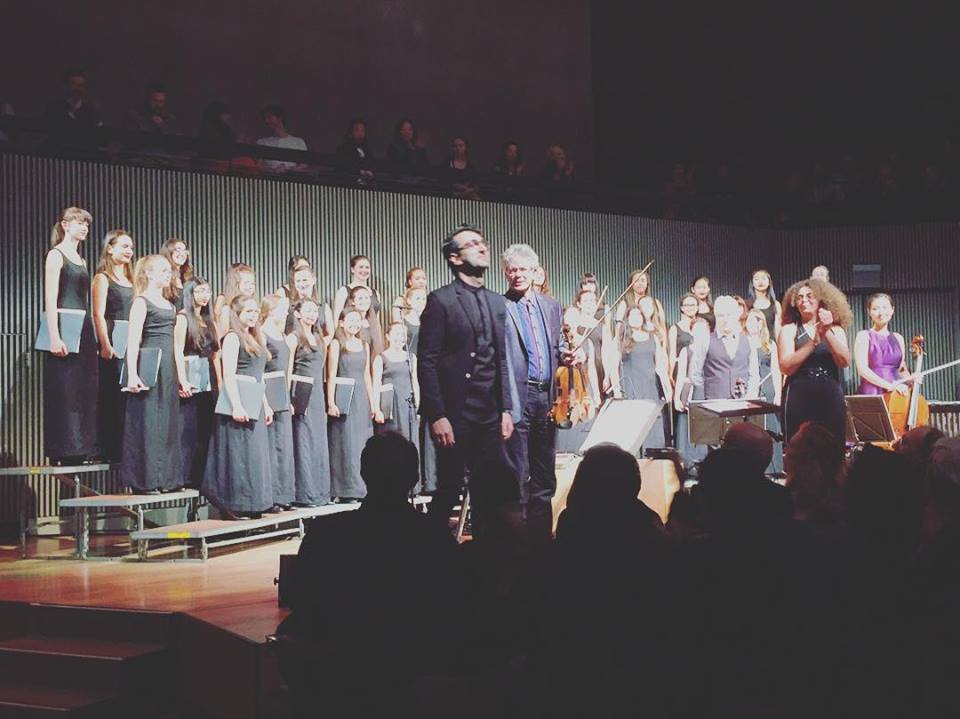Kronos from a Chorister
Dear SFGC Friends and Family, In our time as members of the San Francisco Girls Chorus, we choristers have a multitude of opportunities to collaborate with so many amazing and inspiring musicians. We get to observe how professional musicians work and how they collaborate with one another. We also get to learn a lot about other cultures through our music and our collaborations. This was the case in Friday's concert with the Kronos Quartet at the SFJAZZ Center, during which we sang two pieces: Bubbles, by Aleksandra Vrebalov and Sound, Only Sound Remains by Sahba Aminikia.
Though the Kanbar Center for the Performing Arts is just around the corner from the SFJAZZ Center, I had never sung there before Friday. There could not have been a more inspiring program for our debut performance at the beautiful venue. It was the second time I have performed with the Kronos Quartet. I first worked with them in Southern California one year ago while shooting the first episode of Lisa Bielawa’s TV opera Vireo. Both times I had the opportunity to work with Kronos Quartet, it served as such a wonderful example of what it looks like to be a professional musician, always collaborating.
The first piece we sang on Friday was Bubbles by Aleksandra Vrebalov. The piece was performed by us girls, the Quartet, and a xylophonist, Andy Meyerson. We actually got the chance to work with Aleksandra Vrebalov while rehearsing! Bubbles was originally commissioned by the Brooklyn Youth Chorus for the 80th anniversary celebration for the Black Mountain College. This mysterious and whimsical piece features the text of Robert Creeley and John Cage intertwined with onomatopoeia's and dramatic expressions of bubbles. Bubbles is possibly my favorite piece we have ever sung. We have performed everything from Renaissance-era religious melodies to twentieth century experimental body music, but nothing quite fulfills my yearning for music the way Bubbles has.

This dramatic piece starts with us bubbling silently and grows into an expression of love and pain. When we were first handed this piece in rehearsal, truthfully, we were mostly excited that we got to make funny noises on stage. By the time we were standing on stage, however, we were all jittery with excitement, not because we could buzz our lips together but because we could share such an inspiring message with our audience. A portion of the text is “Locate I love you somewhere in teeth and eyes, bite it but take care not to hurt.” Before going out on stage, we shared ideas about what each of us believed this piece was trying to say. Some interpretations were more abstract than others, but they all shared one linked idea of passion, yearning, and pain. As we walked on to the stage it was obvious what we wanted to share with the audience. Bubbles brought us riveting chords, exchanging harmonies, unsettling silence, and a deeper appreciation of music.
The second piece we sang was Sound, Only Sound Remains by Sahba Aminikia, with text by Forough Farrokhzad. We also got the chance to work with Sahba Aminikia during rehearsal and at the performance. This piece was an especially novel experience for us because not only were we singing with the Kronos Quartet, but also alongside a backtrack that tied the voices and string ensemble together. Before really getting started on learning, memorizing, and perfecting the musical aspects of the piece, we learned what the piece was about.

Sahba Aminikia wrote Sound, Only Sound Remains to make a statement about the oppression of the female voice in Iran. In Iran, women are not allowed to sing in public, and their voices can not legally be recorded or captured. Recorded female voices can only be the backtrack for a male vocalist. For a woman to be a main vocalist is seen as insolent and unattractive. Being an aspiring young female musician, the idea of being restricted from singing is terrible. Music is one of the few releases I believe anyone should be able to access. Sahba Aminikia broke this taboo by recording two women singers, Ooldouz Pouri and Mina Momeni, as the featured soloists in the song. The author of the text, Forough Farrokhzad, was one of most influential Iranian female poets of the 21st century. The first words of the song translate to “sound, only sound remains,” which was repeated by multiple voices overlapping in the recording. As we performed this piece, red light flooding down on us and the soloists’ voices echoing above us on the recording, there was a certain power and intensity among us, a feeling of pride to be singing such a beautiful piece and sharing such an important message as a group of young women.
While I am writing this postcard, reflecting on Friday’s concert and the messages of these pieces, I can't help but become tearful at thinking about all the amazing, life-changing opportunities I have had with the SF Girls Chorus. We have sung with so many amazing artists and groups and performed such important music. I'm sincerely grateful for all that I have gained and the influence it has had on us as young women, many of whom aspire to a life in the Arts.
Sincerely,
Lola Miller-Henline San Francisco Girls Chorus
